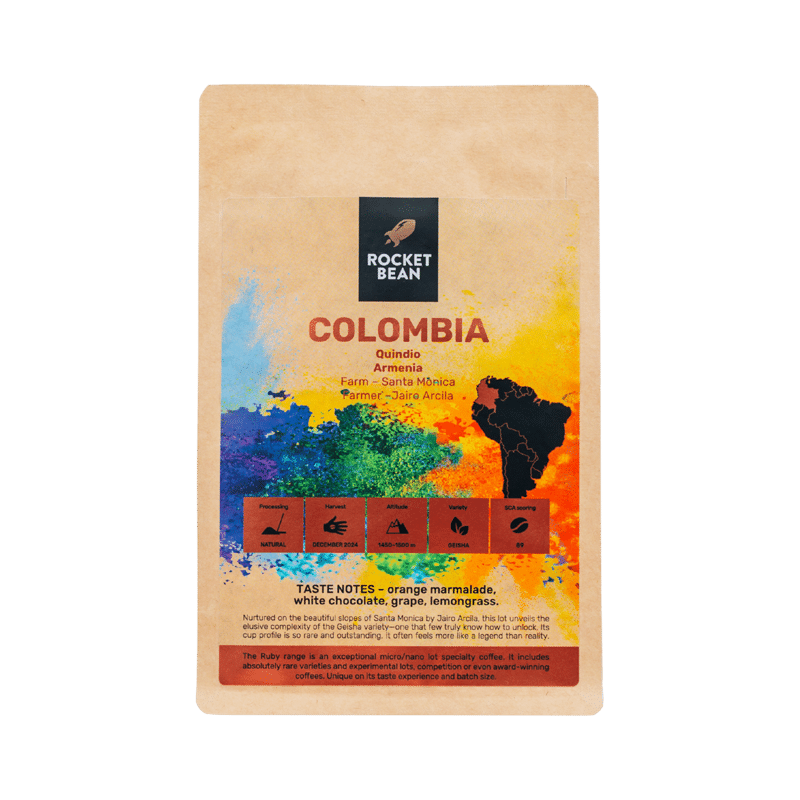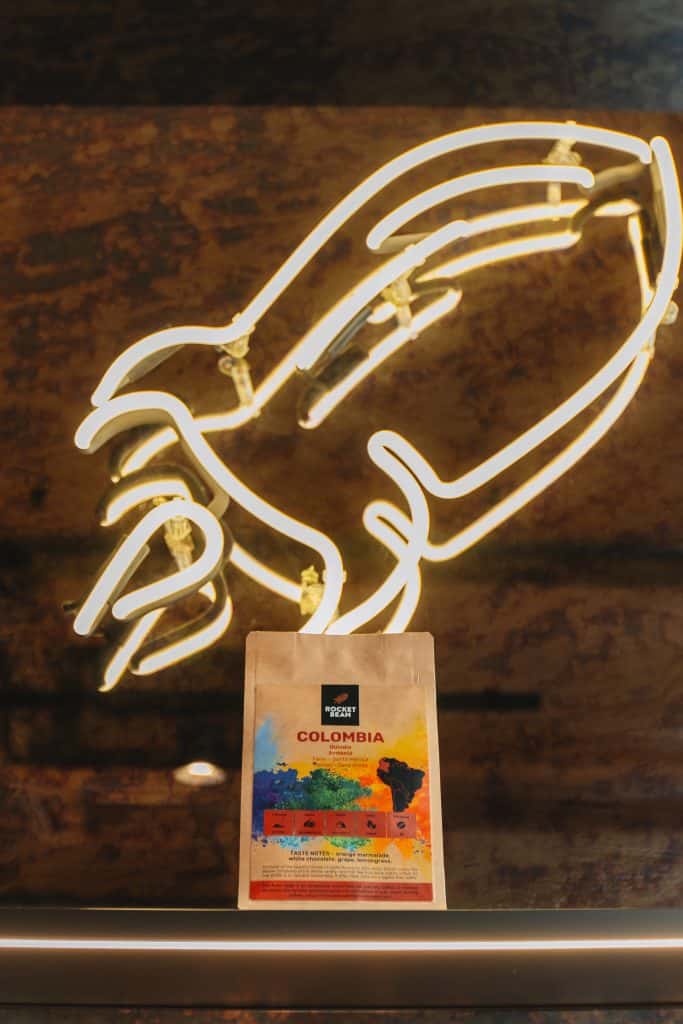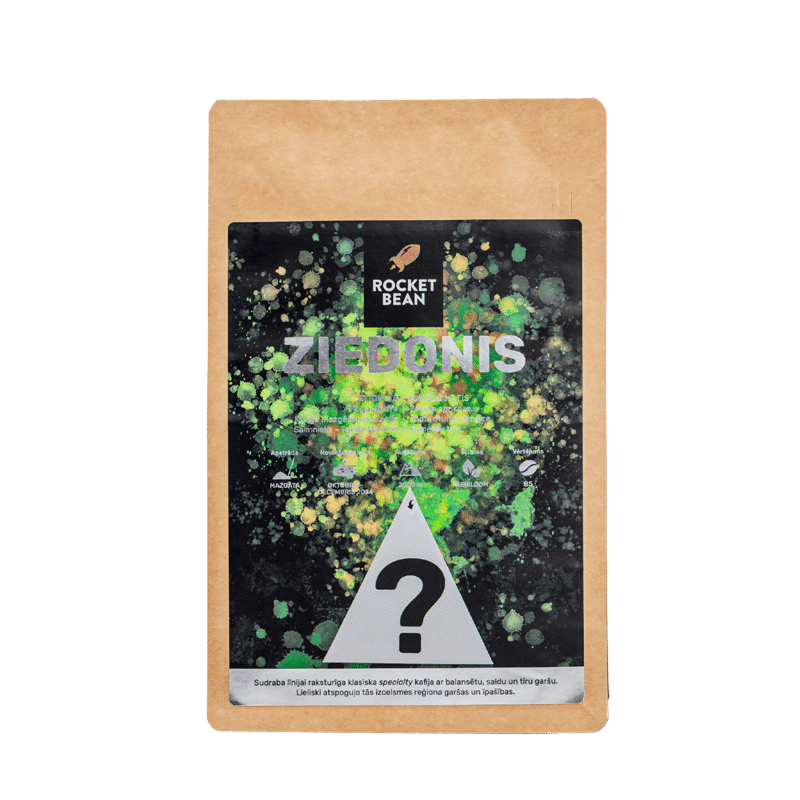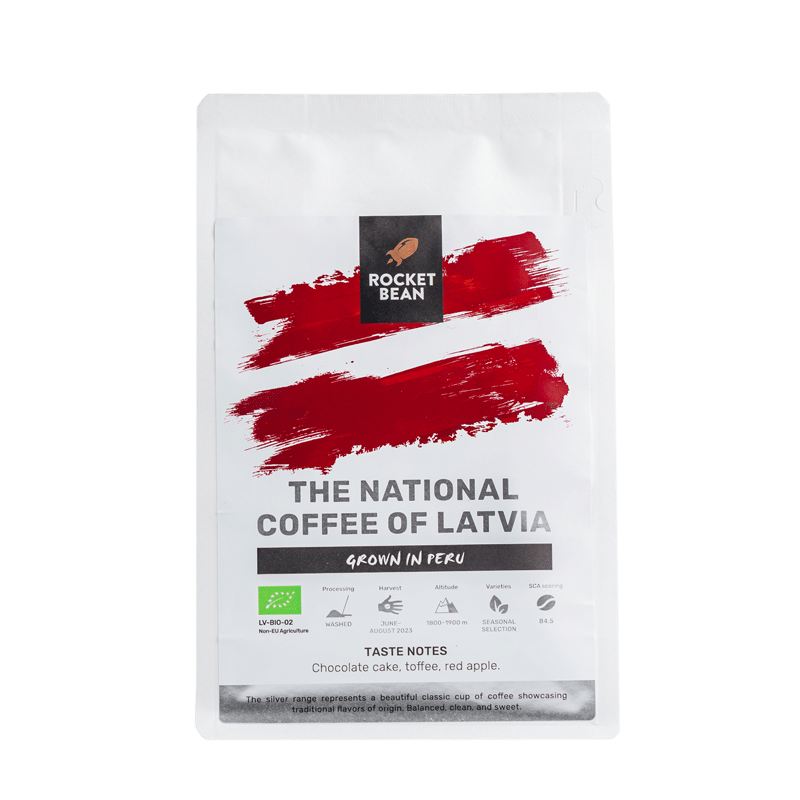Colombia | Quindio, Jairo Arcila, Geisha
filter
- Country: Colombia
- Region: Quindio, Armenia
- Producers: Jairo Arcila
- Taste and Arome: Orange marmalade, white chocolate, grapes, lemongrass
30,00 €
Processing
Natural
Harvest
December 2024
Altitude
1450–1500 m
Variety
Geisha
Scoring
89
Nurtured on the beautiful slopes of Santa Monica by Jairo Arcila, this lot reveals the elusive complexity of the Geisha variety — one that few truly know how to unlock. Its cup profile is so rare and remarkable, it feels more like a legend than reality.
Region
Quindío, located in the western central region of Colombia, is a UNESCO World Heritage site known for its lush green mountains, scenic landscapes, and thriving coffee industry. Quindío is part of the Coffee Axis, also known as the Coffee Triangle, which produces a significant portion of Colombian coffee yearly.
The climate in the region is ideal for coffee cultivation, with average temperatures ranging from 18°C to 24°C year-round and consistent rainfall. The Volcanic soil of Quindío provides excellent drainage and aeration, enhancing the flavour profile of the coffee. The altitude, ranging from 1400 to 1800 meters above sea level, also contributes to the unique characteristics of Quindío’s coffee, which is highly prized globally.
Historically known for commercial coffee, Quindío has relatively recently shifted towards specialty coffee. This change is driven by young farmers who see the potential for a sustainable livelihood in high-quality coffee production. In the past, low prices for commercial grades drove many young people away from coffee farming and to try opportunities in the bigger cities. However, today’s growing specialty coffee market offers better opportunities, encouraging the next generation to stay on the farms and improve coffee quality.
Most of the farms in this region are family-owned farms, typically 2 to 5 hectares in size, and produce traditional Colombian varieties and exotic ones like Gesha and Pink Bourbon. This focus on quality has led coffee from Quindío to regularly place at or near the top of Cup of Excellence competitions. Also, farmers often compete locally to see who has produced the best coffee lots. It helps to foster a vibrant local culture dedicated to quality and growth.
Farmer
Jairo Arcila is a third-generation coffee grower from Quindio, Colombia. His first job was with the second-largest exporter in Colombia, where he worked as their mill manager for over 40 years until his retirement in 2019. In 1987, Jairo bought his first coffee farm, Finca La Esmeralda, where Jairo planted his first Caturra lot. He was fortunate to earn money by producing coffee on his farm and working full-time. Using his savings, Jairo gradually purchased five additional farms: Villarazo, Mazatlan, Santa Monica, Maracay, and Buenos Aires. During the harvest period, within these six farms, Jairo can provide numerous jobs to locals, which has a significant economic impact on their community. As a farmer and producer, Jairo has learned from his experience and his two sons. With their help, Jairo has improved coffee picking, sorting, and processing at his farms.
His sons have also guided and encouraged him in the production of exotic varieties such as Pink Bourbon, Java, Papayo, and Gesha across all his farms. This synergy of generations has resulted in fantastic coffees with astonishing flavour profiles enjoyed around the globe.
Geisha
The story of Gesha begins in the 1930s in the Gori Gesha Forest of Ethiopia, where the variety was first discovered. In 1936, seeds were collected and sent to the Lyamungu research station in Tanzania. From there, the seeds made their way to the Centro Agronómico Tropical de Investigación y Enseñanza (CATIE) in Costa Rica in the 1950s, where they were catalogued as part of a broader effort to study and preserve coffee genetics. Already then, it stood out with its complex floral sweetness. In the 21st century, Geisha gained its spotlight through the “Cup of Excellence Panama” in the early 2000s, causing a sensation in the specialty coffee world with its unprecedented quality. One of the factors contributing to Geisha’s exceptional flavour is its slow maturation process at high altitudes, where cooler temperatures and nutrient-rich soil result in beans with extraordinary complexity. Today, Geisha coffee is cultivated not only in Panama but also in other coffee-producing regions worldwide, each adding its unique twist to this remarkable variety. Despite its widespread cultivation, Geisha remains relatively rare, with limited quantities available each harvest season due to its low to medium yield size.
Processing
This coffee is processed using the Natural EF2 processing method, a carefully controlled technique that combines both aerobic and anaerobic fermentation to enhance the coffee’s complexity and flavor profile. Building on the traditional Natural method, this process introduces specific fermentation stages designed to create a unique and distinctive cup.
The process begins with the selective harvesting of ripe coffee cherries, handpicked at their peak maturity. Ripe cherries are identified by their deep red color, ensuring that only the highest-quality fruit is selected. After harvesting, the cherries are transported to our processing center, where they undergo rigorous quality control. They are first floated in water tanks to remove low-density beans and any foreign materials. The water used during this stage is recycled for additional batches that require floating. Once the water is no longer suitable for use, it is filtered through a series of specialized tanks before being irrigated into vetiver grass beds. This natural filtration process purifies the water, ensuring that no contaminated water is discharged from the processing center and that the operation remains environmentally sustainable.
Following the floating stage, the cherries are meticulously sorted by hand to eliminate any unripe, overripe, or defective fruit. This step ensures that only the best cherries proceed to the next stage of processing. The sorted cherries then undergo a dry aerobic fermentation process for 24 hours. During this initial phase, natural microorganisms begin breaking down the sugars in the mucilage, unlocking the coffee’s flavor potential. Afterward, the cherries are transferred into GrainPro bags for 50 hours of anaerobic fermentation, carefully maintained at temperatures below 22°C to ensure optimal conditions.
Each fermentation stage plays a critical role in shaping the final cup profile. A shorter fermentation period tends to highlight delicate and nuanced characteristics, while a longer fermentation develops complex, intense, and layered flavors. This meticulous process allows us to craft a coffee with a distinct and memorable taste profile.
Once the fermentation stages are complete, the cherries are transferred to raised drying beds, where they are spread evenly in thin layers to ensure consistent airflow and exposure to sunlight. The cherries are carefully monitored and turned regularly to achieve uniform drying and prevent over-fermentation or mold.
The drying process continues until the cherries reach a moisture content of 9.5% to 11%, which is considered ideal. Drying takes place in our greenhouse, where temperatures are maintained between 20°C and 38°C, ensuring a controlled and consistent environment. Once fully dried, the cherries are stored in their husk until it is time to ship them out to Rocket Bean.





